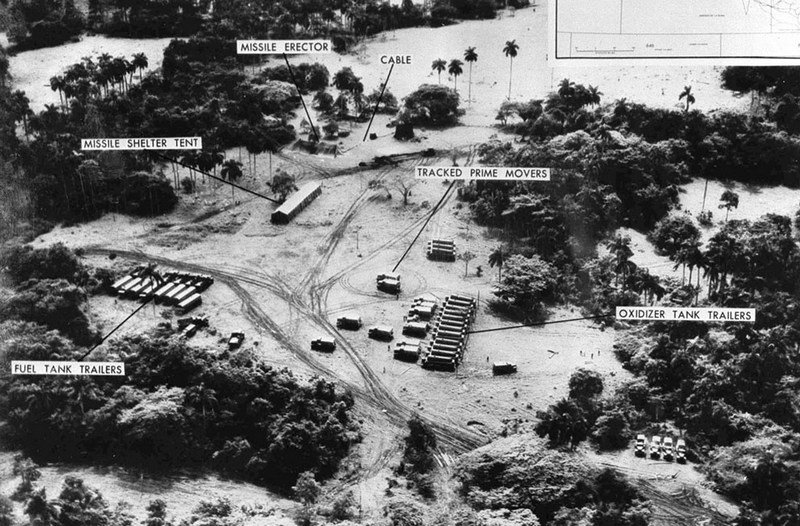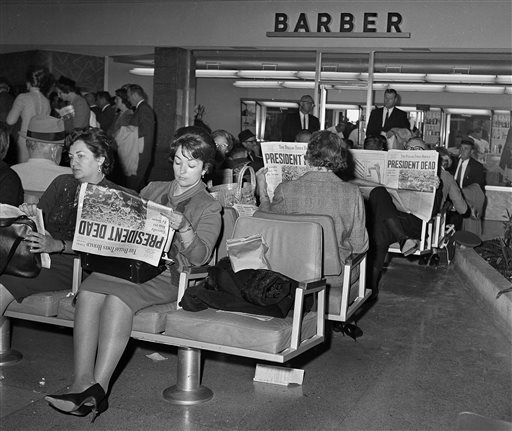Cold War History
Kennedy and Johnson
1961-1969
Chapter 2
John F. Kennedy
1961-1963
Contents
Chapter 1
1945-1961
Truman - Eisenhower
Chapter 2
1961-1969
Kennedy-Johnson
Chapter 3
1969-1981
Nixon-Ford-Carter
Chapter 4
1981- 1991
Reagan - Bush
Any good will that existed between the United States and its World War 2 ally, the Soviet Union, had reached the breaking point in 1961. It fell to the new president, John F. Kennedy, to manage the Cold War conflicts that threatened a new world war. The potential for a nuclear war would either be a deterrence or the end of the world as all knew it.
The Cold War was part reality and part perception. Each accelerated tensions, and each drove countries on the sidelines to join either the eastern or western bloc. Those third world countries that were "non-aligned" were particular targets of the two camps. Cuba was deemed to have crossed that line.
Fidel Castro who led the successful revolution against the Batista government in 1959, entered into a strong relationship with the Soviet Union. His one party government was an alarming replica of communist rule. It would not surprise Americans in December of 1961 when Castro declared he was an adherent of Marxist-Lenin ideology. The United States was deeply concerned with a potential threat 90 miles from Florida. An answer appeared to drop in its lap. An invasion force of Cuban dissidents were trained in Florida by the C.I.A. on orders from the Eisenhower administration.
The 1960 election campaign pitted Senator John Kennedy against Vice President Richard Nixon. In the second nationally televise debate, Cuba was the foremost foreign policy issue discussed. Nixon believed that the island was not a lost cause, and Kennedy declared that the Republican administration had failed to prevent a communist takeover. His last words on the subject: "Today Cuba is lost for freedom."
Nixon claimed that Kennedy was naive, too willing to compromise with the Soviets, and Kennedy responded that the Eisenhower cold war strategy was inept. The winner, Kennedy, was about to unleash another Cold War conflict. . JFKplusfifty.wordpress.com
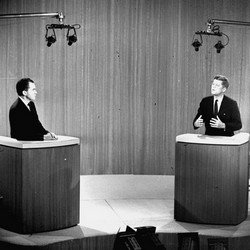
The announcement of the first manned orbital flight piloted by the Russian Yuri Gagarin on April 12, 1961, set off new concerns about the space race. In five days, that story was beneath the newspapers center folds. Kennedy had authorized an invasion of Cuba utilizing Cuban exiles that had trained in the United States under the aegis of the C.I.A. and the direction of President Eisenhower. By April 19, the complete failure of the invasion at the Bay of Pigs was the front page news. www.ashland.edu
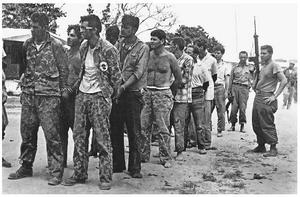
The failure led to wholesale firings in the administration. It went as high as the Director of the CIA, Allen Dulles, and the Kennedy administration was criticized for failure to support the invasion.
On May 25, the nation's attention was diverted by the Kennedy promise to land an American astronaut on the moon and accelerating the Apollo program begun by Eisenhower. America was motivated to win the space race. On February 20, 1962, astronaut , John Glenn, was the first American in space orbit around the earth. The manned Mercury program ran for seven years to 1969 and culminated in the Apollo lunar landing on July 20, 1969. American manned space superiority was affirmed.
On June 4, 1961, the American president met with Chairman Nikita Khrushchev in Vienna. The ailing president was also saddled with the recent Cuban debacle. The agenda included disarmament and Indochina . The status of Berlin took center stage. Khrushchev insisted he would sign a peace treaty with East Germany which would cut off American access to Berlin and force their withdrawal from West Berlin. Kennedy held firm. Threatened with war, Kennedy responded; "Then, Mr. Chairman, there will be a war. It will be a cold, long winter". Had the apparent insecurity of Kennedy emboldened the Soviet leader to test the Americans in Cuba?
Earlier in 1960, the then Senator Kennedy expressed his respect for Khrushchev which belied the common view of the ill educated peasant:
"...was a tough minded, articulate, hard reasoning spokesman".
The Russian's perception of Kennedy, who had met the president when he appeared hesitant, would change in June. Kennedy installed Jupiter intermediate missiles in Italy, Turkey and in Great Britain. Cold War brinksmanship was in play.
In mid-August, the Soviets constructed the notorious wall that cut off West Berlin as well as the entire East German border. Starting as a wire fence and evolving into a concrete 12 foot high wall that ran 96 miles with nine checkpoints. As a general rule, two way, civilian traffic from east to west was prohibited by communist authorities. Crossing points were manned by American soldiers, and on the other side of the barrier, by East German guards.
On October 27, An American diplomat attempted to cross through Checkpoint Charlie. Diplomatic privileges were usually extended and further identification was waived. Not so on this date. The confrontation brought U.S. tanks to the barriers and faced down by Soviet tanks on the other side. After three days of negotiations, arranged through back channels with a Soviet spy, both armored units stood down. Khrushchev later remarked that his tanks could only go forward or back. Going forward meant war so he ordered back.
Cold War History
Kennedy and Johnson
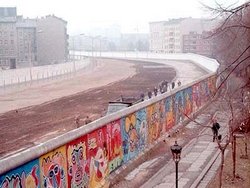 |
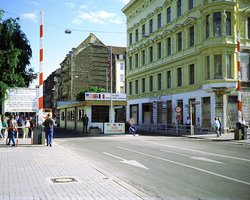 |
On October 31, Americans detected a Soviet atmospheric nuclear test and raised new doubts about nuclear disarmament.
Indochina was subject to international scrutiny in 1954 at the Geneva Conference. The world community had hoped that issues were resolved with "temporary" fixes. Laos, with its problems with internal civil wars, was intended to remain neutral. However, the North Vietnam army and the Viet Cong had invaded that country with the intent to support insurgent communist forces. They refused to withdraw. In the political climate of the time, fear of communist expansion, the United States had a renewed interest in Indochina in 1962. Kennedy added to the small corps of military advisers in south Vietnam. In September of the same year, China attacked India over disputed border areas which was resolved by November 21, 1962.
In mid October, U.S. U-2 aerial reconnaissance over Cuba revealed installations of medium and intermediate nuclear missile installation sites. President Kennedy announced an immediate naval blockade of all offensive weapons to Cuba. A nuclear war appeared very probable and Khrushchev's letter to Kennedy demanded the end of the blockade as a violation of international law. He ended with this statement: It"constituted an act of aggression propelling human kind into the abyss of a world nuclear-missile war". Kennedy, on the other hand, believed "Missiles in Cuba add to an already clear and present danger".
Unlike Kennedy's reticence in the Geneva meeting regarding Berlin, Kennedy told the Soviets that any missile launched from any country in the western hemisphere would be deemed by the United States as an attack by the Soviet Union and responded to with massive retaliation.
On October 27, a U-2 plae over the island was shot down by a Soviet missile crew. Secret negotiations, November 20, 1962, provided that the United States publicly foreswear any future invasion of Cuba and secretly remove its missile sites from Turkey upon the condition of removal of all Soviet missiles from Cuba.The Cuban missile crisis ended without war.
The outcome was consistent with the Kennedy belief that the placement of nuclear weapons required "great care" to avoid changing the status quo.
The two belligerents established direct phone contact and a "hot line" was connected on June 20, 1963.
click to enlarge www.theatlantic.com
The North Atlantic Treaty Organization (NATO) had been formed in 1949
by European and North American countries as a bulwark against Soviet
expansion that threatened the security of any of its members. In 1961, NATOs
military structure was predicated on use of nuclear power immediately
upon any attack. The Kennedy strategy ran counter to its European allies
who adopted the Eisenhower doctrine of massive retaliation. Kennedy
believed in a ground force to meet other situations that did not
require nuclear responses. The president was projecting the advice of General
Maxwell Taylor whose experience had been gained in World War 2 and
Korea. Taylor challenged the massive retaliation strategy
doctrine:
"The strategic doctrine which I propose to replace Massive Retaliation is called herein the Strategy of Flexible Response.....capability to react across the possible challenge, for coping with anything from general atomic war to infiltrations and aggressions such threats in Laos and Berlin in 1959".
The bottom line is that Europe did not desire to pay the freight for the divisions necessary to face those in the Warsaw pact countries. Kennedy, to underscore his position, added 40,000 Americans to the NATO force.
In a few short years, the United States operated under a third way. National Security Adviser, Henry Kissinger, in the later Nixon administration, stressed joining diplomacy with the military option. Essentially, he was supporting diplomacy with a nuclear threat.
On June 10, the president sent a signal in an address at American University. He wanted a new attitude toward Soviet Russia to gain peace. He was attempting not to exacerbate matters in Indochina. He had rejected bombing North Vietnam and mining their Haiphong harbor. Surprisingly, the "old soldier" General Douglas MacArthur agreed.
"Anyone wanting to commit American ground forces to the mainland of Asia should have his head examined".
On June 21, 1963,
France announced that it was withdrawing its navy from the North
Atlantic fleet of NATO. That did not appear to be any impetus for a
limited test ban treaty. but shortly thereafter in October a new agreement with the Soviet Union provided
for only underground testing of nuclear weapons. It would take another five years (1968) to address the problem of nuclear proliferation (Nuclear Non-Proliferation Treaty-NPT). Kennefy commenting on the french leader, General Charles de Gaulle: "The greatest cross I have to bear is the Cross of Lorraine."
Three years later France (1966)
completed its total withdrawal from NATO. Sub rosa, NATO backroom conversations viewed
France as free loaders who would immediately expect its former NATO
partners to extend protection in the event of an attack from the Soviet
Union. French President DeGaulle was the butt of these statements. This
occurred under President Johnson's watch. Accepting that
this was another eccentric move by DeGaulle, he rhetorically shrugged
his shoulders.
Prime Minister Diem of South Vietnam, a reputed choice of the United States, had lost favor because of his corrupt and repressive government. On August 14, Kennedy sent a message to Diem to ease restrictions on Buddhists and other critics. Diem appears to have rejected the "advice". He was assassinated on November 2, 1963, with possible Kennedy administration and CIA implications.
The
Allen Dulles CIA was in the business of arranging coups against leaders
in countries that were unfriendly to the United States. In his mind,
the Cold War was merely an extension of World War 2 and Korea. The CIA
counter intelligence unit let by James Engleton waged a crusade against
communists and employed spies and double agents for 20 years. Novelists
were treated to this extensively fertile field by rewriting, and
sometimes revising, the history of cold war espionage.
The Diem death was just one of many conspiracy theories that would surface after the assassination of President Kennedy on November 22, 1963.
What is incontrovertible is the gunman, Lee Harvey Oswald, had numerous
connections with communism. He had spent time in Russia and Cuba. That
spawned the inevitable, but unproven, theory of Soviet or Cuban
involvement. click to enlarge AP photo Dallas Airport
Retrospectively, Kennedy desired to end the Cold War. He had a willing partner in Khrushchev. But both were bound in varying degrees by their institutions to military and political counsel. The Russian, more so, to the intransigence in the Kremlin. Kennedy was able to disagree with those advisers who were only interested in winning the cold war--not just ending it.
In the summer of 1963, The UK, USA and the USSR agreed to ban all nuclear tests except underground. Kennedy pointedly proceeded in the negotiations without consultation with administration naysayers in the State Department and Pentagon.
Lyndon Baines Johnson
1963-1969
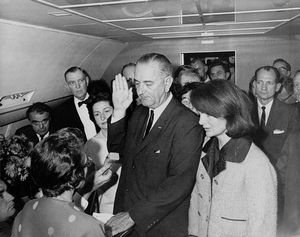
On the eve of the Kennedy assassination (November 22), Vice President Lyndon Johnson broke with the administration on the subject of a wheat sale to the Soviet Union. On October 11, 1963, Kennedy was ready to fill a Soviet request for wheat due to a failed, weather related, harvest. Despite the hardened Cold War animosities, the American public appeared ready to back the Kennedy policy that was rejected by Johnson. The common sentiment was to make a dollar off the Russians,when possible, and supply them with anything as long as the product could not be shot back at the United States.
The Johnson hard line about the wheat sale, that he viewed aided the enemy, paled when measured against decisions Johnson faced when he entered the oval office as the new president. The political and military problem in Vietnam was disintegrating, and the new president was deeply conflicted. He was more of a supporter of the domino theory than his predecessor. The communists would take one small country at a time and dominate Asia.
In his first year as president (1964), he has been quoted as saying:
"What in the hell is Vietnam to me? What is it worth to this country?
One year later (1965), the Johnson refrain, despite serious doubts, was:
"If we are driven from the field in Viet-Nam, (sic) then no nation can ever again have the same confidence in American protection".
After the first comment in 1964 , President Johnson inexplicably increased his aid to the Saigon government. The Hanoi government in the north was not passive. They sent an additional 10,000 men south to aid the Vietcong. They continued to develop the Ho Chi Minh Trail that ran, in part, through the purportedly neutral countries of Laos and Cambodia, and poured in aid to the guerrilla forces operating through this region of Indochina. Much of the materials aid, in large part, was supplied by China and the Soviet Union. The Soviet's may have been a reluctant partner. On the one hand, they had encouraged revolution and pledged their support, but, at the same time, they were as ambivalent about war as Johnson. The Soviet's desired peace with the west, but knew that the United States would view North Vietnam as a Soviet surrogate.
In April 1964, President Johnson and Nikita Khrushchev jointly announced they would reduce production of radio active materials required for nuclear weapons. In the space of four months, August 4, Johnson told the public that the United States navy had been attacked in the Gulf of Tonkin off the coast of North Vietnam. He reported the attack with questionable data which led to the congressional Gulf of Tonkin Resolution.
On October 14,
Johnson and the United States were confronted with a new adversary.
Leonid Brezhnev succeeded Nikita Khrushchev as First Secretary of the
Communist Party. An office he would occupy until his death in 1982.
Khrushchev had lost stature with his party as a result of the Cuban
Cold War crisis. Brezhnev would not repeat the mistake. He was
determined to be a hard liner in the Cold War. Unexpectedly for changes in the Soviet hierarchy, Khrushchev was allowed retirement without bloodshed or a coup.
The new Soviet leader's efforts to reform the economy of the USSR through 1965 would be an uphill battle. It was a case of keeping up with the Jones'. In this matter, Jones was the U.S.A. whose economy was more robust and capable of meeting the costs of an expanding defense establishment.
During March 1965, the United States maintained a heavy bombing schedule over North Vietnam. However the demands of the Cold War to resist communist subversion, particularly in the western hemisphere, required Johnson to land marines on the shores of the Dominican Republic ostensibly to protect Americans (April 28). He was forced to reinforce the small contingent with a second landing that turned the tide of insurgency on the island. A new election eliminated the communist threat.
On July 25, Johnson reinforced American forces in Vietnam with 50,000 new troops.
1965 ended with heavy U.S. casualties in South Vietnam's La Drang Valley.
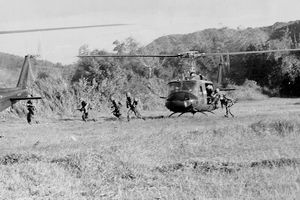
In 1966, the Cold War heavies were coasting on existing hard line policies. The relative volume was turned up a notch with a third Chinese nuclear test on May 8. In August, the border war in South Africa began with overtones of another extension to the Cold War.
There were counter revolutions occurring in South Asia in 1967 against left leaning, entrenched governments. On March 12, the anti -communist, General Suharto, overthrew President Sukarno of Indonesia. Suharto would maintain power for another 30 years solidly in the western camp.
Countries south of the United States entered into the Treaty of Tlatelolco on April 25.
The agreement banned nuclear weapons throughout the Caribbean ,
Central and South America. Some signatories were late to the game.
Argentina did not sign until 1997. France, Holland and the
United States were included to cover those islands under their
protection, but were not signators until years later. Ultimately, the ban extended to Africa and Australia.
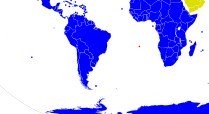
On June 15, Israel went to war with Arab neighbors. The Soviets supplied weapons to the Arabs extending their middle eastern influence in this six day war definitively won by Israel.
Finally, there was a three day summit arranged between Johnson and Soviet Premier Kosygin beginning June 23. Nominally, Kosygin shared power with Brezhnev. That sharing theory of government did not translate into reality. Brezhnev was the boss.
The parties met in Glasboro, New Jersey. They met ostensibly to increase cooperation, but there was no agreement on limiting ballistic missile systems. Nevertheless, in 1970, the Soviets did reach an agreement with America's West Germany ally. The Moscow agreement with Chancellor Willy Brandt recognized the current borders and foreswore any future use of force. Essentially, the Soviet Union's indefinite presence was assured.
On August 8, a group of South Asian countries met in Bangkok and agreed that they would protect their independence from expansionist communist infiltration (Thailand, Philippines, Indonesia, Singapore and Malaysia). The Philippines had fought for years against communist guerrillas.
The year ended with an optimistic expression from General Westmoreland and his staff in Vietnam assuring the American public that the end was near for North Vietnam, and that there was "light at the end of the tunnel".
On January 23, 1968, President Johnson's New Year present was the news that the U.S.S. Pueblo, an American intelligence gathering ship off the coast of North Korea, was captured by that country. Johnson's inability to gain the immediate release of the crew was a blow to his credibility and the power of the United States. It took the balance of the year to gain their release (December 23).
As 1968 began, Americans were greeted with the pessimistic news that was contrary to General Westmoreland's rosy outlook. North Vietnam commenced their Tet offensive on January 31 that would not end until June 8. If it was an American victory, somewhat questionable considering casualties, it would not translate into the final result of the war. But it did have an immediate effect on the president. On March 31, he told the nation he would not stand for reelection. Four years earlier he had swamped the war hawk, Republican candidate, Barry Goldwater, with a campaign promise he would not escalate the war in Vietnam. A brilliant domestic program should have given Johnson an easy victory for a new term, but the war, that obviously conflicted him, had seriously diluted his legacy.
In April, there was an uprising in Czechoslovakia known as the "Prague Spring". The Warsaw Pact countries responded with overwhelming force to crush the insurrection.
On July 1, the most significant Non Proliferation of Nuclear weapons was signed by all of the known nuclear powers (China, France, UK, U.S.A. U.S.S.R.) with the exception of India, Israel, North Korea, Pakistan and South Sudan. North Korea would ultimately sign, but never be in compliance.
A highly controversial Democrat primary for president to succeed Johnson was waged between the current Vice President, Hubert Humphrey, still an advocate for the war, pitted him against anti war candidates Eugene McCarthy and Robert Kennedy. The latter had eclipsed McCarthy, but the Robert Kennedy assassination June 6 opened the door for victory for the Republican candidate Richard Nixon. He promised a "secret plan" to end the war which would never be divulged.
______________________________________________________________
For References and Sources:
Chapter 1 Truman and Eisenhower
Chapter 3 N ixon, Ford, Carter
History of American Wars | Cold War Timeline | Cold War History
